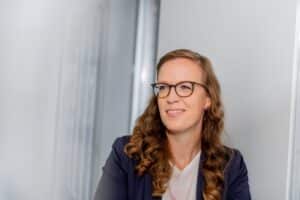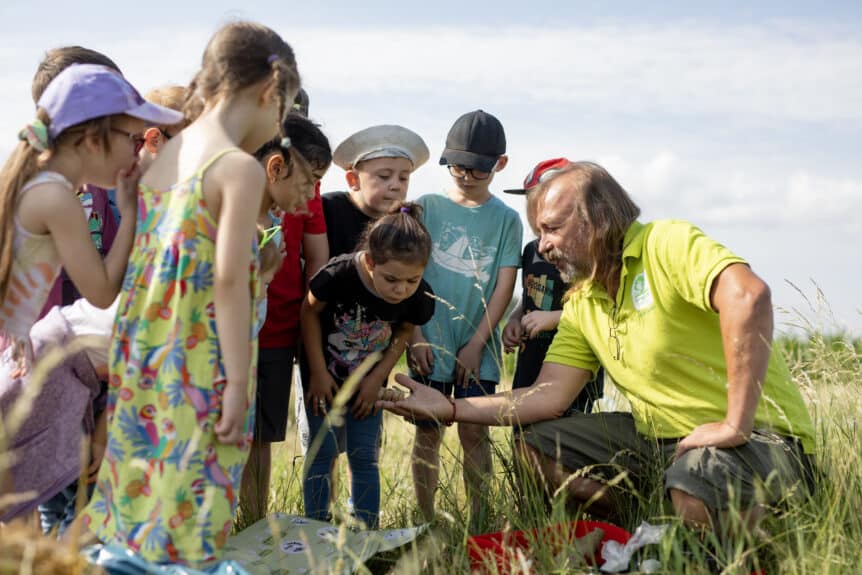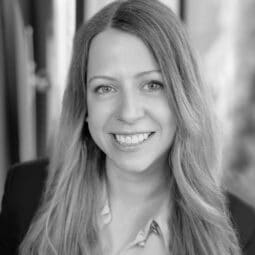Corporate development and sustainability at VR Bank Rhein-Neckar

Christin, it’s been a while since our last conversation with you for the zeb podcast series “Sound of Finance”. Can you briefly recap what your daily work in your new role involves?
As Head of Corporate Development, I deal with issues relating to the transformation and further development of VR Bank Rhein-Neckar. For one thing, there is the topic of sustainability, which has long been close to my heart. In this context, we look at all aspects of how our bank can contribute to sustainability, e.g. with lower CO2 emissions in our business operations, a sustainable product range for our customers or the integration of ESG criteria into risk management. We don’t ever do this alone – but always together with the specialist departments.
On top of that, I am also responsible for our internal project management, which supports all major projects within the bank and aims to ensure effective and efficient implementation. We are currently building up the topic of innovation from scratch. To this end, we have created a change cluster that we call “Innovationskraftwerk” (Innovation Power Plant). We support this from the corporate development perspective with two innovation managers who orchestrate and coordinate the entire innovation process. And finally, the Corporate Development department supports the strategy process as a coordinator and sparring partner.
What are the main topics that you are currently focusing on in your job as Head of Corporate Development and Sustainability or that you are going to focus on in the near future?
The beginnings of our bank go back some 140 years, and we keep asking ourselves the question: How can we set up our organization in a way that it can survive for the next 140 years? To this end, we want to enable the bank to deal with change in a systematic way. That’s why we are creating the organizational and procedural prerequisites for change in all its forms and establishing an innovation and trend management system.
We are also currently introducing a new strategy process for the bank. We have done a major SWOT analysis of the entire organization in recent weeks, the results of which we are now looking at in detail to derive appropriate measures.
Sustainability has of course become a perennial topic. I’ve worked in my new role for almost exactly a year now and have come to realize that our employees are among the most important drivers for the success of sustainable transformation. We are therefore currently testing different formats and channels to determine how we can best engage, involve and motivate our employees.
Sustainable transformation: challenges and opportunities
What do you see as the biggest challenges still facing you at VR Bank Rhein-Neckar and other banks with regard to sustainability?
Meeting the regulatory requirements in connection with sustainability is a mammoth task. What’s more, the mothers and fathers of the new requirements and key figures, such as the Green Asset Ratio, certainly did not have a regional bank and its SME customers in mind when developing them. All banks have to mobilize a lot of resources, but often the added value in terms of sustainability is not even recognizable at this stage, so I understand all employees who are groaning under the new obligations.
But of course we want to create real added value and support our customers’ green transformation. This requires new products and services, which we are currently working on together with our colleagues from the specialist departments.
We have already taken lots of measures to make our own business operations more sustainable. But like all banks and companies, we often struggle with conflicting objectives: we want to invest in new, green technologies and transformation in order to cut back on CO2 emissions and reduce our consumption, but at the same time our business model should of course still be profitable. And we also want to be a good employer and offer our customers the best possible service.
A simple example: We could massively reduce our carbon footprint if we sent all employees away to work from home on a permanent basis and only served our customers digitally, but would we still be a good employer and able to offer our customers the personal service for which they value us as a regional cooperative bank?
How do you motivate customers and employees to go along with sustainable transformation?
There is no single answer to that – there are many. We have developed a very comprehensive concept that includes various formats for involving managers and sensitizing and involving employees, which we are testing. We realize that different formats are required to get each employee on board, taking into account their individual needs and levels of knowledge.
Two examples:
- Focus group workshops, in which we collaborate with employees to identify the wishes and demands directed at the bank regarding sustainability and gather their sustainable ideas, have proven to be particularly effective. This is reflected in the feedback from participants who also report feeling appreciated when they are given this opportunity.
- Just a few days ago, there was a particularly positive response to our vacation childcare offer for employees’ children. During the summer school break, we spent a whole day looking after interested employees’ children, supported by two “orchard educators”, in one of our meadow orchards, making herbal lemonade with them from herbs they had picked themselves and introducing them to the big (sheep) and small (insects) animal inhabitants of the meadow. We actually only had the children in mind, but we noticed that this had a very positive effect on their parents, who were really enthusiastic. So this is a further motivator for a concerted effort to achieve greater sustainability at the bank.
The situation is similar with regard to our customers: as a cooperative bank, we aim to be a bank for everyone, so we encounter very different opinions, attitudes and needs among our customers. Through our advisory board, which is made up of a selection of supervisory board members as well as private and corporate customers, we try to involve our stakeholders, e.g. in deciding which sustainability goals we should particularly focus on as a bank. And, of course, we also gather their feedback on which products and services we should offer to best support customers in their sustainable transformation.
Just at the moment, we are working on the question of what support services beyond traditional banking might be useful for our corporate customers so that they can also leverage the opportunities that the transformation entails, along with the many obligations.

Christin’s career path to sustainability
Why did you decide to pursue a career in the financial industry, specifically in consulting? And why did you later focus on sustainability?
It all started with my first account at the cooperative bank in my hometown near Fulda. I have always found investing and financial markets exciting. My first investments as a minor (always with my parents’ signature, of course) during the dotcom bubble in the early 2000s went disastrously wrong. I intended to get to the bottom of this after leaving school when I decided to study business administration with a focus on finance. I wanted to understand what drives the financial markets and holds them together at their core.
After graduating, I worked as a capital market analyst in large trading rooms and was able to observe the financial markets and their participants up close. In the aftermath of the collapse of Lehman Brothers and the subsequent financial crisis (in the course of which I personally lost money on the markets again in every conceivable way), many capital market analysts became unemployed – including myself. In this rather disruptive situation for me, I ended up at zeb more or less by chance and good fortune. Here I was able to continue to use my knowledge and skills and expand them rapidly thanks to the ever-changing topics, new clients/banks and new people with whom I had the pleasure to work.
Sustainability and a love of nature have always been part of my private life. As sustainability was also becoming increasingly important for banks and for zeb, this gave me the opportunity to combine my personal and professional interests in a meaningful way. In my private life, I can only achieve so much, but if I make sustainability my professional focus, my leverage is a lot greater. Because what drives me forward time and again is the desire to be able to tell my two children one day: I have worked hard to leave behind a world worth living in for you.
Promoting women in the financial industry
Another component of sustainability is the social sphere, which also includes work-life balance and diversity. How do you manage to combine your current job with your family and spare time?
With a high degree of freedom and flexibility, which fortunately my employer grants me. I can very much determine my own schedule, and my colleagues are considerate when it comes to my time restrictions. Working from home and having only a short bike ride to work also help a lot. At the same time, it takes a lot of discipline to delegate and prioritize tasks and to say no sometimes – admittedly, I still need to work on that. Ten years at zeb naturally contribute a lot to the efficient use of tools and technology as well as the efficient planning and running of meetings.
What advice do you have for women in the financial industry, especially those who work in consulting or aspire to positions like yours?
It takes good leaders and mentors who recognize and promote the strengths of their female employees (and the male ones too, of course) and encourage them to fully exploit their potential. If you don’t have this kind of support, go out and look for it! And because many people are used to traditional role division from their own upbringing, there is also a need for good role models and examples of how things can work.
How do you think banks and consultancies can attract more women as successful employees?
We recently conducted a survey among female colleagues at VR Bank Rhein-Neckar and asked them what prevents women at the bank from taking on more professional responsibility or applying for a leadership position. One of the reasons given was that women don’t dare take on more responsibility because they don’t consider professional responsibility and family to be compatible. Banks and consultancies must therefore demonstrate with good examples that it can be done and, where possible, show and grant flexibility.
BankingHub-Newsletter
Analyses, articles and interviews about trends & innovation in banking delivered right to your inbox every 2-3 weeks
"(Required)" indicates required fields
About LebensWert gGmbH
In addition to your role as Division Head, you are also Managing Director of LebensWert gGmbH. This organization recently celebrated its two-year anniversary. How did you come to assume this role and what has been the highlight of your work so far?
The business purpose of LebensWert gGmbH, a subsidiary of VR Bank Rhein-Neckar, is to promote regional environmental protection and landscape conservation projects as well as environmental education. Our customers can participate in this by passing on part of their service fee for our sustainable investment products to LebensWert gGmbH.
We currently manage three meadow orchards in the Rhine-Neckar region: We plant old fruit varieties, maintain old trees, contribute to more biodiversity in the meadows with wildflowers and sheep grazing, provide nesting aids and shelter for insects, birds and small mammals, and regularly bring school and kindergarten children to our meadows to teach them about their flora and fauna with the support of our orchard educators.
The role of Managing Director was part of the job description and one of the reasons I joined the bank. Driving forward the sustainable transformation of the bank is often frustrating and takes an enormous amount of time. All the better that our orchards allow us to make a positive impact even in the short term.
We recently had 20 second-grade school kids and two female falconers with their owls and falcons in our meadow in Ludwigshafen-Oppau. In our green classroom, the children learned where these birds of prey live and how they hunt. The children were allowed to become falconers themselves and, equipped with a falconer’s glove, hold an owl on their arms.
When they had to go, one boy said: “That was the best day of my life.” Isn’t that the nicest compliment for our environmental education program? We’re on the right track when the children go home with a new-found respect and fascination for nature and its wonders.
Thank you very much for answering the questions and for your time!

